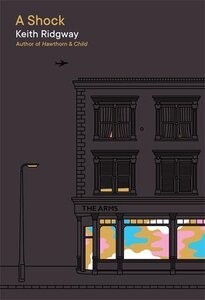I loved Keith Ridgway’s previous novel, Hawthorn & Child. It was a key book in helping me appreciate different types of writing, in that it dissolved narrative coherence as it went along. So I was really looking forward to Ridgway’s new book, A Shock. I found a similarly fragmented structure, but a warmer, in the end more hopeful, tone.
The nine story-chapters of A Shock are set around the same community in south London, with some overlapping characters. It’s the overlap that creates a sense of connection: loose and precarious, but persisting despite everything the modern world throws at it.
In the opening ‘The Party’ (which you can read on the New Yorker website), we meet an old woman at home while her neighbours are hosting a loud party. She’s lived an eventful life that others can only guess at, but now time is standing still for her:
…here I am, the leftover part, the unresolved plot, the loose end, the woman in the house, the house in the woman, the cat, the unkempt garden, the clothes in the wardrobe that she cannot throw out and cannot wear, the furniture she moves so that she can forget, and moves back again so that she can remember, and remembering anyway whatever she does, lost in a little roundabout life…
All this woman really wants, one senses, is to be able to tell her story to someone. The yearning that comes through in this piece is powerful.
Elsewhere in the novel we find different kinds of stories being told or withheld. In ‘The Camera’, we meet friends Stan (who’s white) and Gary (who’s black). Gary talks about wanting a new camera; when he gets one, he starts taking photos of Stan and posting them to him. Stan can’t seem to understand why Gary would do this, and his apparent inability to assume a straightforward explanation puts a strain on their friendship. “You get to clock off and I don’t,” Gary reminds Stan, seeing an all-too-familiar story being played out.
In ‘The Joke’, Stan’s partner Maria pushes her bike up the hill to a different world, where she works as a library assistant in a private school. One of the teachers tells her a remarkable story that turns out to be a fabrication – an unwelcome reminder of life’s instability.
OK, admittedly this isn’t sounding very hopeful. But there’s hope in A Shock if you look for it. Perhaps there will be someone in the Arms pub with a tale to tell. Maybe it takes a random moment of human connection – and it might be necessary to rely on the randomness. The world of A Shock is not an easy one for its characters to live in, but there are ways for them to hold on. Reading this is a vital experience.
Published by Picador.
Click here to read my other reviews of the 2021 Goldsmiths Prize shortlist.

Recent Comments